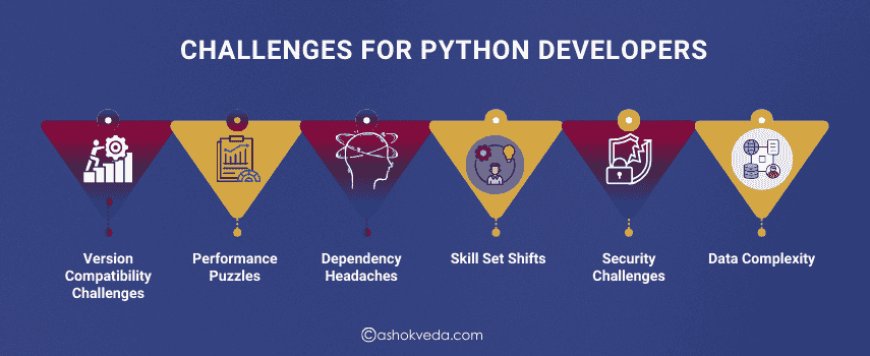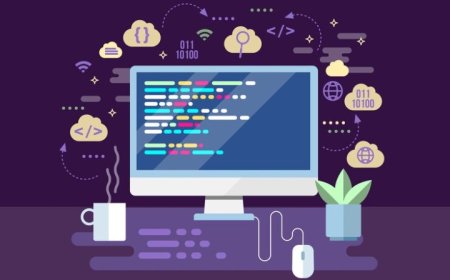Python Developer-Tips and Tricks for Success
Stay ahead in the tech game by adapting to industry needs. Your guide to not just surviving but thriving in the dynamic world of Python development

Python developers are in high demand these days as corporations integrate technology into every aspect of our life. Imagine Python as the super language that can easily move from web development to data science, artificial intelligence, and automation. Why? Because it's the cool kid on the block in addition to being flexible.
Here's the thing, though staying current with Python trends is a need, not an option. The tech industry is rapid and unpredictable, much like a rollercoaster. Developers need to have cutting-edge abilities that align with industry demands in order to ride it like a pro. It all comes down to mastering new frameworks and grabbing the newest technological developments.
Essential Skills for Python Developers
Core Programming Concepts:
Mastery of fundamental programming concepts is paramount for any Python developer. A strong grasp of variables, data types, loops, conditionals, and algorithms forms the bedrock of effective coding. Understanding concepts such as object-oriented programming (OOP) and functional programming enhances code structure and readability.
Proficiency in Python Frameworks (Django, Flask, etc.):
A Python developer should be adept in utilizing popular frameworks like Django and Flask to streamline the development process. Django, with its batteries-included philosophy, is excellent for robust web applications, while Flask's lightweight nature is suitable for smaller projects. Competence in these frameworks allows developers to create scalable, maintainable, and efficient applications.
Version Control Systems (Git):
Git proficiency is essential for collaborative coding projects. It enables developers to track changes, manage different versions of their code, and collaborate seamlessly with team members. Understanding branching, merging, and pull requests in Git is crucial for efficient collaboration and code management.
Challenges for Python Developers
1. Version Compatibility Challenges:
Python's frequent updates create difficulties in keeping projects compatible with different language versions. Maintaining stability while adapting to changes is a constant balancing act.
2. Performance Puzzles:
Despite Python's readability, performance concerns arise for resource-intensive tasks. Developers often need to optimize or explore alternative solutions to meet performance demands.
3. Dependency Headaches:
Managing dependencies can be complex, with intricate dependency trees leading to compatibility issues. Balancing dependencies for stability becomes a crucial aspect of Python development.
4. Skill Set Shifts:
The evolving tech landscape demands continuous skill adaptation. Developers need to stay updated on new frameworks and tools to remain relevant in modern software development.

5. Security Challenges:
As technology advances, ensuring application security is crucial. Python developers must prioritize secure coding practices and stay informed about the latest security protocols.
6. Collaboration Hurdles:
Collaborative development brings its own set of challenges. Effective communication and tools are essential for managing code integration and projects in distributed teams.
7. Data Complexity:
Handling large datasets and creating scalable data processing pipelines pose challenges for Python developers working on data-intensive applications.
In what ways can Python developers efficiently traverse and overcome obstacles? What are the most vital tips and tricks that enable Python developers to overcome challenges and advance their skills?
Addressing the challenges encountered by Python developers necessitates emphasizing the importance of refine problem-solving skills. The ability to systematically approach and resolve issues is fundamental in controlling the complexities of software development. Encouraging developers to develop this proficiency establishes a strong foundation, enabling them to overcome obstacles with efficiency. Developers must embrace a proactive approach to stay informed about emerging technologies and methodologies.
In addition to individual growth, building a sense of community is essential. Python developers can benefit greatly from participating in online communities that provide a supportive network. These communities serve as valuable platforms where developers can share insights, seek guidance, and collaboratively address challenges. The collective wisdom and shared experiences within these forums contribute to a dynamic and interconnected ecosystem.
Tips and Tricks for Success in Python Development
Building a Solid Foundation
a. Mastering Core Python Concepts: Develop a comprehensive understanding of Python's foundational elements, including variables, data types, loops, and conditionals. Focus on acquiring proficiency in the language's syntax and conventions.
b. Exploring Data Structures and Algorithms: Enhance problem-solving skills by immersing yourself in various data structures (lists, dictionaries, etc.) and algorithms. Understand their practical applications and efficiency in different scenarios.
Version Control Mastery
a. Recognizing the Importance of Version Control Systems: Understand the crucial role of version control in tracking changes, enabling collaboration, and maintaining project history. Appreciate its practical benefits in Python development.
b. Git Overview and Application: Familiarize yourself with Git, a widely-used version control system. Learn essential commands, branching strategies, and collaborative workflows tailored for Python projects.
Effective Debugging Techniques
a. Utilizing Built-in Debugging Tools: Explore Python's built-in debugging tools, such as pdb, to efficiently identify and resolve issues within your code.
b. Exploring Third-Party Debugging Libraries: Investigate external libraries like pdb++ or PySnooper to enhance debugging capabilities with additional features and insights.
Dependency Management Best Practices
a. Understanding Virtual Environments: Grasp the concept of virtual environments to isolate project dependencies, ensuring a clean and reproducible development environment.
b. Introduction to Package Managers like pip: Learn to use pip for installing, managing, and distributing Python packages. Emphasize the importance of specifying dependencies in a requirements.txt file.
Writing Clean and Efficient Code
a. Adhering to PEP 8 Guidelines: Follow Python Enhancement Proposals (PEP 8) for code style to enhance readability and maintainability. Employ tools like flake8 to automatically check for compliance.
b. Utilizing Docstrings for Documentation: Implement descriptive docstrings to thoroughly document your code. This practice promotes collaboration and aids in generating comprehensive documentation.
Continuous Integration and Deployment
a. Implementing CI/CD Pipelines: Set up Continuous Integration and Continuous Deployment pipelines using platforms like Jenkins, Travis CI, or GitHub Actions. Automate testing, code analysis, and deployment processes.
b. Ensuring Code Quality through Automated Testing: Develop a robust suite of automated tests using frameworks like unittest or pytest to verify code correctness. Integrate unit tests, integration tests, and functional tests into your CI/CD pipeline.
Staying Informed and Engaged
a. Regularly Reading Python-Related Blogs and Forums: Stay updated on industry trends, best practices, and new features by frequently reading reputable Python blogs. Engage in discussions on forums such as Stack Overflow and Reddit.
b. Participating in Online Communities: Connect with the broader Python community through platforms like Stack Overflow and Reddit. Contribute to discussions, seek help when needed, and share your knowledge.
Building a Portfolio
a. Showcasing Personal Projects and Contributions: Create a portfolio highlighting your Python projects, contributions to open source, and noteworthy achievements. Include project descriptions, code samples, and outcomes.
b. Creating a Strong Presence on Professional Platforms: Optimize your GitHub profile with a concise bio, contributions graph, and well-documented repositories. Strengthen your LinkedIn presence by showcasing Python-related skills, projects, and endorsements.
Networking and Collaboration
a. Recognizing the Importance of Networking: Attend Python meetups, conferences, and webinars to expand your professional network. Connect with industry professionals, share experiences, and explore collaboration opportunities.
b. Collaborating on Open-Source Projects: Contribute to open-source Python projects to gain practical experience, collaborate with experienced developers, and showcase your skills to a broader audience. This offers valuable insights into real-world coding practices.
In conclusion, successful Python development boils down to simplicity in code, thorough documentation, regular testing, attaining version control, holding automation through CI/CD pipelines, and maintaining a curious mindset for continuous learning.
Take on each coding challenge as an opportunity to enhance your skills. The world of Python development is dynamic, and your willingness to learn and adapt will set you apart. Celebrate your victories, learn from setbacks, and relish the joy of crafting elegant solutions. Your commitment to continuous improvement is the true key to sustained success.
Refer these blogs:




































